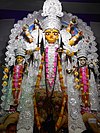Ghatu
| Music of Bangladesh | |
|---|---|
 | |
| Genres | |
| Specific forms | |
| Religious music | |
| Ethnic music | |
| Traditional music | |
| Media and performance | |
| Music awards | |
| Music festivals | |
| Music media | Radio
Television Internet |
| Nationalistic and patriotic songs | |
| National anthem | Amar Shonar Bangla |
| Other | Notuner Gaan (National March) Ekusher Gaan (Ode to the Language Movement) |
| Regional music | |
| Related areas | |
| Other regions | |
Ghatu, Ghetu Gaan, or Ghetu Song is a type traditional cultural song of the Eastern Part of the Bangladesh.[1] The songs were traditionally sung during the monsoon season,[1] though the tradition is on the decline.[2] The festival was mainly held in north-eastern side of Mymensingh and lower part of Sylhet in Bangladesh.[3]
History[edit | edit source]
The first day of Bhadro (5th month of Bengali calendar) started on the eve of Bisharjan of Manasha (Bengali: মনসার ভাসান)[1] and later celebrated on the day of Vijaya Dashami during the monsoon season.[3]
The festival revolves around a teenage boy. The boy dresses in shari and grows out his hair, with the intent of resembling a girl.[3] The very young boys were sexually abused and that contributed to the decline of this form of music.[4] During the festival he plays the role of pantomime by dancing or otherwise representing the Ghatu song. The Ghatu songs are mainly oriented around Radha Krishna.[3]
In popular culture[edit | edit source]
- The film Ghetuputra Komola by Humayun Ahmed was based on the life of a young Ghatu Singer.[5]
References[edit | edit source]
- ↑ 1.0 1.1 1.2 Varot kosh 3rd part (ভারত কোষ) (in Bengali). Kolkata: Bongiyo Sahityo Porishod. p. 275.
- ↑ Afsaruddin, Mohammad (1990). Society and Culture in Bangladesh. Book House. p. 141.
- ↑ 3.0 3.1 3.2 3.3 Bhattacharya, Asutosh (1962). Banglar Loko Sahityo (in Bengali). Kolkata.
{{cite book}}: CS1 maint: location missing publisher (link) - ↑ "::: Star Weekend Magazine ::". www.thedailystar.net. Retrieved 2018-02-06.
- ↑ "Ghetu Putro Kamola". The Daily Star. 2012-09-07. Retrieved 2018-02-06.
